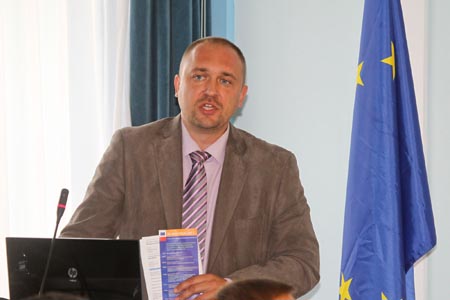|
IN THE SPOTLIGHT |
Eastern Partnership Civil Society Forum
|
|
Belarusian National Platform of the EaP Civil Society Forum: moving forward in contradictive process
Ulad Vialichka, Chairperson of International Consortium “EuroBelarus”, National coordinator of the Forum for Belarus Socio-political situation in Belarus has considerably deteriorated, in comparison with the launching moment of the Eastern Partnership initiative (this, of course, is not due to our country's participation in the program, but to other factors’ impact, which are mostly related to internal Belarusian specifics). State authorities have been continuously ignoring the efforts, proposals and appeals of the civil society, as well as those regarding the civil society itself, since December 2010. The repressive mechanisms are regularly used; their actual symbol has become the arrest of our colleague, Ales Byalyatski, head of the Human Rights Centre "Viasna". A chain of recently adopted laws regarding criminal responsibility for organizing non-approved public events and using non-registered external funding for CSO activities is purposefully leading to crucial restriction of rights and freedoms of Belarusian citizens. In such circumstances, it is impossible to effectively participate in the Eastern Partnership initiative neither at the state, nor at the civil society level. It is obvious that without addressing system problems in very Belarus it’s impossible to dream of getting any meaningful "dividends" from this important European program. Priorities for further development All abovementioned challenges pose the Belarusian National Platform of the EaP Civil Society Forum towards the necessity of rethinking its role and place in the country and within the program itself, and force to find answers to the issue of format of the National Platform’s further existence and development. During the recent year of CSF activity Belarusian National Platform has held three big conferences (April 11-12, July 5, and October 29, 2011), adopted 5 resolutions, developed a number of statements and joint addresses. Belarusian participants of the platform have taken part in various international theme-based events including EaP conference in Warsaw in September 2011 and also presented number of policy papers and opinions regarding state of affairs in Belarus and possibilities to move forward relations between Belarus and the EU. At the same time intensity of activities within CSF working groups at national level significantly decreased despite the tries to implement the road map idea in the particular working formats. Given the existing challenges and obstacles to achieving the objectives of the Eastern Partnership, there is a clear need to expand the agenda of the National Platform. That is, to include in the list of urgent tasks the issues that go beyond the objectives of the Eastern Partnership, but on solution of which directly depend future of the country, its civil society organizations and success of the further processes of transformation. Of course, such a solution would imply, in a certain sense, a new vision and a new role of the National Platform in the ground Belarusian processes. Therefore, this decision can only be taken on the basis of extensive discussion and only by the supreme authority of the National Platform – the General Assembly. Given the proven availability of alternative visions and approaches to the building of the National Platform, of fundamental importance is seen saving opportunities for the deployment of platform-based variety of initiatives, campaigns, coalitions and programs which may contain a component of alternativity towards each other. This would greatly enrich the very Platform and will provide non-exclusion of its activities of various actors who have different visions but equally share common values, principles and objectives of the National Platform. Thus, in my opinion, the activities in the framework of the National Platform should be based not only on the mechanisms of agreement and consensus, but also on the mechanisms of coordination and synchronization of members’ of the Platform activities, while maintaining its character of the common site and the arena of intercommunication. Exactly such approach would be a vivid demonstration of the fundamental democratic approach and inclusiveness of the National Platform, approval of its commitment to the priorities and norms of the Eastern Partnership. Despite the fundamental impossibility of launching the processes of social and political dialogue in our country at the moment due to closed position of the Belarusian state, the National Platform must nevertheless consider this possibility as a perspective and realistic one, to prepare to it purposely from today already, to develop appropriate relationships with other civil society organizations, as well as with dialogue partners (political parties, trade unions, religious organizations, cultural and intellectual groups, etc.). Such an approach towards dialogue will provide an appropriate place, role and importance of the civil society in these processes as soon as their implementation will become possible. Some aspects of the activity Of course, modern challenges and internal self-organization should be directly linked with concrete activities and ideas for implementation by the efforts of the platform participants. What can be done within the National platform activity on the basis of such institutionalization?
I also hope very much that Belarusian civil society organizations will explore the road map format presented by them at the last forum in Berlin and demonstrate active position at the Forum meeting in Poznan in November 2011. The result of it could be initiating several regionally settled “flagship” projects at civil society level. Poznan can become very good springboard for such ideas in cooperation with organizations from the partner and EU countries. For more information, please, visit www.eurobelarus.info
|
Project funded by the European Union
![]()








